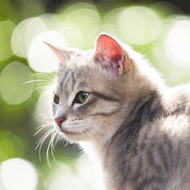
Concerns over lack of nutrients in animal-free diets
Vets have spoken out against vegan diets for cats, after the issue was debated in a recent BBC News story.
With a growing trend for veganism, there is thought to be an increasing number of cat owners who wish to share their values with their pet cats.
BBC journalists spoke to cat owner Joanna Farr, who feeds her two cats a vegan diet. She said critics have accused her of being an ‘animal abuser’.
Gudrun Ravetz of the BVA commented: “We at the British Veterinary Association cannot recommend that cats are fed a vegan diet.”
During the BBC video, Shannon Falconer, CEO of Because Animals, who is developing an animal-free pet food, claimed that while cats in the wild are obligate carnivores, these nutrients could be sourced from other places for a commercial diet.
Ravetz added: “When we’re talking about nutrients and we look at things like arginine, which are vital to help cats get rid of waste products, and we talk about vitamin A and we talk about taurine. These are all nutrients that the cat needs and would be life-limiting without them.
“These are products that are predominantly found in animal sources and are very difficult to get from any other substance, other than an animal source.”
She urged any pet owners to speak to their vet about any potential changes to their pet’s diet.
Commenting on the story, BSAVA’s senior vice-president John Chitty said: “As cats are obligate carnivores, a vegan diet is wholly inappropriate for a cat. This is not an ethical matter but a health and welfare issue. BSAVA fully endorses the BVA’s stance on this issue.”
Andy Sparkes, veterinary director for iCatCare, added: “Human beings make choices about their own diets based on a variety of reasons. Some people choose to live on a vegetarian or vegan diet and, although care needs to be taken, this can be done successfully without health problems.
“Unfortunately, the same is simply not true for cats. Cats have developed and evolved as ‘strict carnivores’. This means that they have developed a unique metabolism that, put simply, requires a supply of a number of nutrients only found in a meat/animal-based diet.
"Without these nutrients cats develop a variety of diseases and will die. Several nutrients (including certain vitamins, amino acids and fatty acids) are required by a cat in its diet that can only be found in animal-based diets. This is simply the result of the development of cats as a predator species – they are not able to adapt to or survive on a plant-based diet.”
Mr Sparkes said that while “in theory” it is possible to supplement a vegetable-based diet with chemically derived and synthetic nutrients, “in practice this is very difficult to achieve and is potentially dangerous as it can readily lead to disease and death of the cat if not done properly”.
He added: “People who have a strong ethical or moral objection to feeding meat to their pets should consider whether they would be better owning an alternative pet that can be fed a natural meat free diet (such as a rabbit) rather than impose an unnatural and potentially highly dangerous diet on a cat.”



 The latest
The latest